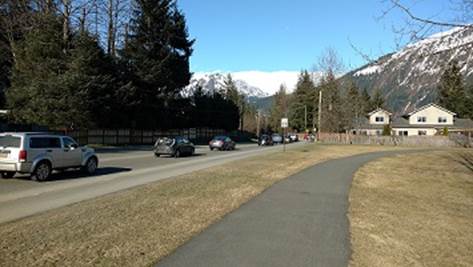Juneau Riverside & Stephen Richards
Congestion Mitigation Project SFHWY-00081

Project Scope
The project will reduce congestion in the Mendenhall Valley maintenance area by improving the Riverside Drive and Stephen Richards Drive Intersection. The current four-way stop will be replaced with a traffic control option that will improve traffic flow, particularly during AM and PM peak periods. A compact roundabout and enhanced signalization will be considered as potential solutions to current congestion at this intersection.
Current Conditions
DOT&PF contracted consultants Kinney Engineering to analyze the Riverside Drive / Stephen Richards Memorial Drive intersection and to develop traffic control alternatives to reduce congestion in the area. A preliminary review of the intersection's performance was presented to DOT&PF in an Existing Conditions Report.
Click HERE to view a PDF document of the full report.
Click HERE For a PDF document of a short summary
The primary findings of the Existing Conditions report are:
- The current all-way stop control was installed in 2008, and since that time lower crash rates have been observed.
- The intersection currently experiences long queues and excessive delay during the morning and evening peak hours. The traffic pattern is very directional. In the morning peak hour, the predominant movement is southbound through traffic towards downtown, and in the evening peak hour it is northbound through traffic returning to the Mendenhall Valley. About half of the traffic moving the intersection during peak hours is in one direction, with the morning peak traffic heading southbound and the evening peak traffic heading northbound.
- In the morning peak hour, delay currently averages 89.4 seconds per vehicle, or about 29 hours of delay every day. This is expected to increase to 112.2 seconds per vehicle or 39 hours of delay every day by 2040 if the existing four way stop is left in place.
- In the evening peak hour, delay currently averages 88.7 seconds per vehicle, or about 33 hours of delay every day. This is expected to increase to 151.1 seconds per vehicle or 64 hours of delay every day by 2040 if the existing four way stop is left in place.
Click here for more project information
